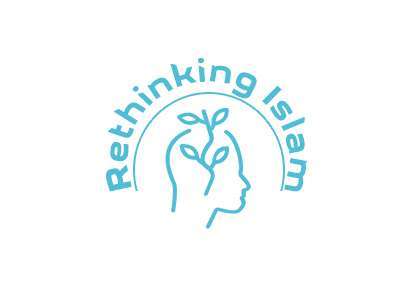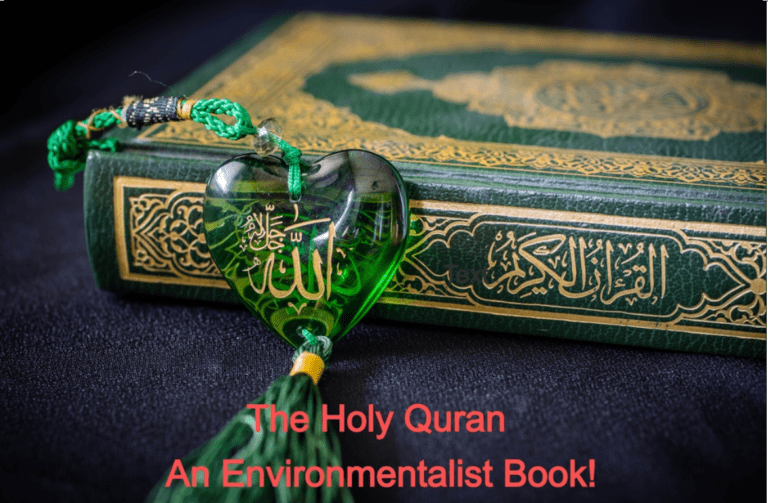Climate change has emerged as one of the most pressing global challenges of our time. Its far-reaching impacts, including rising temperatures, extreme weather events, and sea-level rise, have the potential to disrupt ecosystems, endanger human lives, and exacerbate social and economic inequalities. While discussions on climate change predominantly focus on scientific and policy perspectives, it is worth exploring how various religious traditions have addressed this issue. This blog delves into the Islamic perspective on climate change, highlighting how Islamic scriptures, particularly the Quran and Hadith, provide valuable insights, guidance on environmental stewardship and sustainability and ownership of Generation Z.
Islam’s Environmental Ethos:
Islam, as a holistic faith, emphasizes the interconnectedness between humans and nature. It teaches that the natural world is a creation of ALLAH and that humans are entrusted with the responsibility of being caretakers (khalifah) of the Earth. The Quran, the central religious text of Islam, and the Hadith, the sayings and actions of the Prophet Muhammad, offer guidance on the ethical treatment of the environment and sustainable practices. By examining these sources, we can uncover the foresight of Islam regarding climate change and its relevance in the present context.
Nature as Signs of Allah’s Creation:
The Quran frequently refers to the natural world as signs (ayat) of Allah’s creation. It encourages believers to reflect upon the intricate balance and harmony in nature as evidence of ALLAH’s wisdom. Verses such as “And it is He who spread the earth and placed therein firmly set mountains and rivers; and from all of the fruits He made therein two mates; He causes the night to cover the day. Indeed, in that are signs for a people who reflect” (Quran 13:3) emphasize the need for contemplation and appreciation of the Earth’s ecosystems.
Stewardship and Accountability:
Islam emphasizes the concept of stewardship (amanah) and accountability (hisab) regarding the use and conservation of natural resources. The Quran reminds believers that they will be held accountable for their actions on Earth, including the treatment of the environment. “Corruption has appeared throughout the land and sea by [reason of] what the hands of people have earned so He may let them taste part of [the consequence of] what they have done that perhaps they will return [to righteousness]” (Quran 30:41).
Conservation and Avoidance of Waste:
Islamic teachings advocate for conservation and the avoidance of waste. The Prophet Muhammad encouraged his followers to minimize excess consumption and emphasized the importance of moderation (ihsan) in all aspects of life, including the use of natural resources. The Hadith includes numerous references to the conservation of water, energy, and food, urging believers to avoid extravagance and excessive consumption.
Protection of Ecosystems and Biodiversity:
Islam promotes the protection of ecosystems and biodiversity, recognizing their intrinsic value and their role in maintaining balance on Earth. The Quran describes the interconnectedness of all living beings and their reliance on one another. “There is not an animal that lives on the earth, nor a being that flies on its wings, but they are communities like you” (Quran 6:38). This verse highlights the need for environmental conservation to ensure the well-being of all creatures.
Generation Z, as the upcoming generation, has a crucial role to play in addressing climate change while referencing the Islamic teachings on environmental stewardship. Here are some practical steps that individuals from Generation Z can take to align their actions with Islamic principles:
Education and Awareness: Begin by educating yourself about the scientific realities of climate change (The Islamic Declaration on Climate Change) and its impacts. Learn about the specific environmental challenges faced by your local community and the world at large. Understand the Islamic teachings related to the environment, climate change, and sustainable living. This knowledge will empower you to make informed decisions and advocate for change.
(The Islamic Declaration on Climate Change, endorsed by Islamic scholars worldwide, emphasizes the responsibility of Muslims and the global community to address climate change. It calls for an equitable and binding climate agreement with clear targets and monitoring mechanisms. The declaration urges countries to phase out greenhouse gas emissions and transition to 100% renewable energy. It highlights the importance of adaptation measures, particularly for vulnerable communities. The declaration aligns with other faith-based statements, emphasizing collective action and environmental protection. It recognizes the significance of the oceans in regulating the climate and calls for strict regulation and control of the high seas. The declaration underscores the urgency for multilateralism, multi-faith dialogue, and active engagement to protect the planet. Overall, it emphasizes the shared responsibility of caring for the Earth and the need for collaborative efforts to address climate change).
Reduce Carbon Footprint: Take steps to minimize your carbon footprint. Make conscious choices in your daily life, such as reducing energy consumption, conserving water, and minimizing waste. Embrace eco-friendly habits like using public transportation, biking, or walking whenever possible. Consider adopting a plant-based or low-impact diet that reduces greenhouse gas emissions associated with animal agriculture.
Sustainable Consumption: Be mindful of your consumption patterns. Avoid excessive consumerism and prioritize conscious consumption. Choose sustainable and ethically produced products, opt for reusable items instead of disposable ones, and support local and environmentally responsible businesses.
Renewable Energy and Technology: Promote and support the adoption of renewable energy sources. Encourage your community and institutions to invest in solar panels, wind turbines, and other sustainable energy solutions. Embrace energy-efficient technologies in your own life, such as LED lighting and smart appliances.
Environmental Activism: Get involved in environmental activism and raise awareness about climate change within your community. Organize or participate in local initiatives, such as tree planting campaigns, beach clean-ups, or recycling drives. Engage in peaceful protests, advocacy, and social media campaigns to amplify the importance of climate action and the Islamic perspective on environmental stewardship.
Sustainable Agriculture: Support sustainable and organic farming practices. Promote local and organic food sources, reduce food waste, and consider growing your own fruits, vegetables, or herbs in community gardens or home-based setups. Encourage the use of sustainable and regenerative farming methods that protect soil health and biodiversity.
Interfaith Collaboration: Collaborate with individuals from different faith backgrounds to address climate change collectively. Engage in interfaith dialogues and initiatives that promote environmental conservation and sustainability. Recognize the shared values and goals of different religious traditions and work together towards common objectives.
Personal and Community Leadership: Be a role model within your family and community. Encourage others, including friends, peers, and family members, to adopt sustainable practices and raise awareness about climate change. Inspire others to embrace Islamic teachings on environmental stewardship and engage in collective action.
Remember, these steps are not limited to adhering to Islamic teachings alone. They align with broader principles of environmental sustainability and can be adopted by individuals of any faith or background. By living in harmony with the environment, Generation Z can make a meaningful contribution to mitigating climate change and building a more sustainable future for all.
nn
References:
- How Generation Z Will Change the World
- Both Gen Z & Millennials Believe This Is The Biggest Problem Their Generations Face Now
- How climate change is re-shaping the way Gen Z works
Addressing Climate Change Challenges:
Drawing from the Islamic principles of environmental stewardship and sustainability, Muslims today are increasingly engaging in efforts to address the challenges posed by climate change. Islamic organizations and scholars have emphasized the importance of adopting eco-friendly practices, renewable energy, and sustainable agriculture. The Islamic Declaration on Global Climate Change, issued in 2015, called upon Muslims worldwide to take action against climate change, recognizing the moral duty to protect the environment.
Climate change poses an existential threat to our planet, and addressing this challenge requires a collective effort from individuals, communities, and institutions. Exploring religious perspectives, such as Islam’s, can provide valuable insights and motivation for environmental stewardship.
Islam’s foresight regarding climate change can be found in its emphasis on the interconnectedness between humans and nature, the concept of stewardship, and the importance of conservation and sustainability. The Quran and Hadith offer guidance on responsible resource management, moderation in consumption, and the protection of ecosystems and biodiversity.
Today, Muslims around the world are embracing these teachings and incorporating them into their daily lives. Islamic organizations are promoting sustainable practices, eco-friendly initiatives, and renewable energy solutions. They are also raising awareness among their followers about the urgency of addressing climate change and the moral responsibility to protect the environment.
Furthermore, Islamic teachings on environmental stewardship can foster interfaith dialogue and collaboration. Recognizing the shared values of different religious traditions in addressing climate change can lead to collective action and cooperation among diverse communities.
It is crucial to note that while the Quran and Hadith provide principles and guidance, their interpretation and application in the context of climate change are subject to ongoing scholarly discussions and evolving understanding. Muslims, like followers of other faiths, have diverse perspectives and interpretations, and the response to climate change may vary among individuals and communities.
Islam’s perspective on climate change provides a significant framework for addressing environmental challenges. By drawing from the Quran and Hadith, Muslims are encouraged to be responsible stewards of the Earth and engage in sustainable practices. The Islamic principles of interconnectedness, accountability, conservation, and biodiversity protection offer valuable insights that can inspire action and contribute to global efforts to mitigate climate change and build a more sustainable future for all. Embracing these teachings can create a harmonious relationship between humans and nature and foster a sense of environmental responsibility among individuals and communities, transcending religious boundaries for the benefit of present and future generations.
https://www.youtube.com/watch?v=2TfnKPqvRgQ&t=11s
In British Columbia, Canada, massive floods and landslides are washing out roads and bridges. Thousands of people have been evacuated, and a few people have even died. Dr. Shabir Ally and Dr. Safiyyah Ally look at why extreme weather events are happening and point to verses from the Quran that emphasize the responsibility human beings have to maintain the balance God has set for all living creatures. They urge Muslims to act decisively to limit climate change and preserve the environment.

